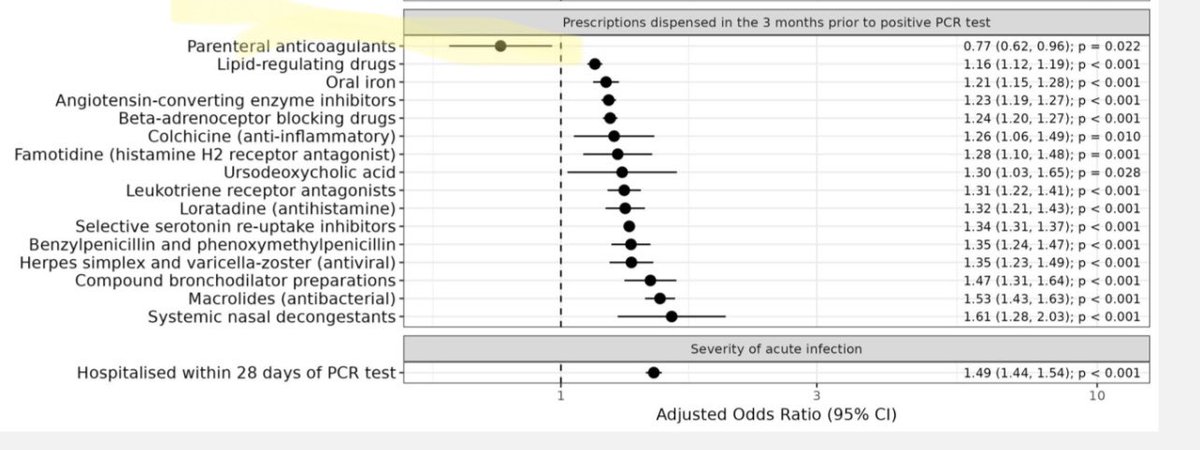You are using an out of date browser. It may not display this or other websites correctly.
You should upgrade or use an alternative browser.
You should upgrade or use an alternative browser.
Deriving and validating a risk prediction model for long COVID, 2023, Jeffrey et al
- Thread starter Amw66
- Start date
Andy
Senior Member (Voting rights)
For those who can't see the tweet, it is of a poster presentation of the results from a study into risk factors for Long Covid.
"*Important long Covid study results from Scotland:* Researchers followed up 1.1 million people after Covid to see if anything reduced the odds of #LongCovid & found parenteral anticoagulants (Parenteral means injected not oral) lowered the risk
Covid is a vascular disease"
A n=1 anecdote. Some might recall that when I experienced a c.6 month partial but significant remission around 4 years ago, it had followed my c.6-week long stay in hospital for gallstones/gall bladder issues. Obviously masses of different other things also happened at that time (gall bladder removal, anaesthesia, sedation, several endoscopies, hospital food, several doses of antibiotics, etc) but it did also include, as part of that length of stay, routinely given injected anticoagulants. So maybe it was the anticoagulants, maybe it was something else, maybe it was everything.
rvallee
Senior Member (Voting Rights)
Evidence for vaccination reducing Long Covid is less well-defined, as much of it depends on population statistics and can be explained by reduced ability for the virus to take hold at all, no COVID = no Long Covid, same as less COVID = less Long Covid. As far as I know, this is the only evidence of reduction in people infected enough with COVID to be ill, and those were all severely ill patients.
It's pretty significant, too:

This really warrants a rapid research effort. If it disproves it it's still good, we need to know and so far there are zero treatment paths.
I checked and for the micro-clot treatment by Pretorius's team, I can't say for the antiplatelet drugs, but the anticoagulant (Apixaban) is taken orally.
It's an interesting study. 1.1 million adults with Covid-19. 1 in 16 had Long Covid - 6.2%. That sounds reasonable, not the ridiculous percentages (e.g. 50%) that we have seen reported from some studies. I don't know how they defined Long Covid.
However some of those risk factors (i.e. of: female, older, higher BMI, more deprived, severe Covid-19, worse health (co-morbidities, prescriptions) suggest that "Long Covid" is including a lot of people with post-covid symptoms that are probably related to non-ME/CFS causes e.g. lung damage.
That finding of parenteral anticoagulants helping is intriguing. Is there anything about people taking parenteral anticoagulants that could confound the theory that the drug is protective against Long Covid once a person has contracted Covid-19? For example, perhaps they were resting at the time of the Covid-19, rather than trying to push through the illness?
It's interesting to look at the drugs that were associated with increased risk too. A number of them look to be related to allergies.
However some of those risk factors (i.e. of: female, older, higher BMI, more deprived, severe Covid-19, worse health (co-morbidities, prescriptions) suggest that "Long Covid" is including a lot of people with post-covid symptoms that are probably related to non-ME/CFS causes e.g. lung damage.
That finding of parenteral anticoagulants helping is intriguing. Is there anything about people taking parenteral anticoagulants that could confound the theory that the drug is protective against Long Covid once a person has contracted Covid-19? For example, perhaps they were resting at the time of the Covid-19, rather than trying to push through the illness?
It's interesting to look at the drugs that were associated with increased risk too. A number of them look to be related to allergies.
Last edited:
Michelle
Senior Member (Voting Rights)
but it did also include, as part of that length of stay, routinely given injected anticoagulants.
I've written in an earlier post that I experienced an improvement in my symptoms while on low-dose heparin. But like you, it was part of a number of treatments and it's hard to disentangle what was causing what. And I, too, am following the microclot/anticoagulate line of enquiry with great interest. Though oral anticoagulants such as warfarin and rivaroxaban have had no impact at all on my ME/CFS symptoms.
LarsSG
Senior Member (Voting Rights)
Looks potential interesting, but it also looks like they included a lot of variables and with p = 0.022 this could just be noise. It also looks like being a carehome resident and having dementia are also protective; perhaps there is a correlation with those factors and parenteral anticoagulants use or their adjustment for age has gone wonky somehow.
